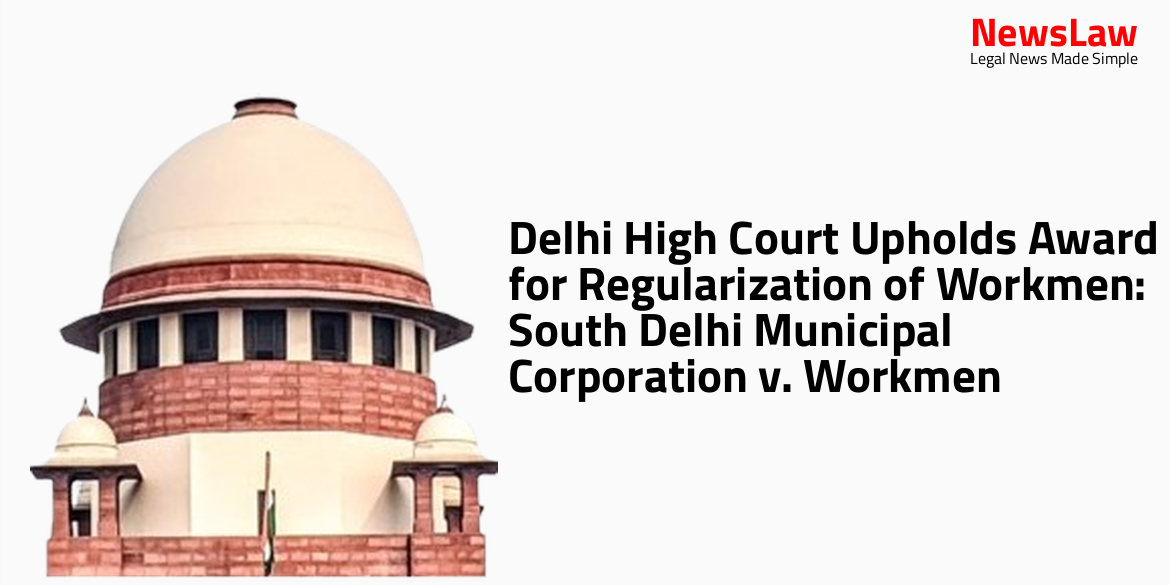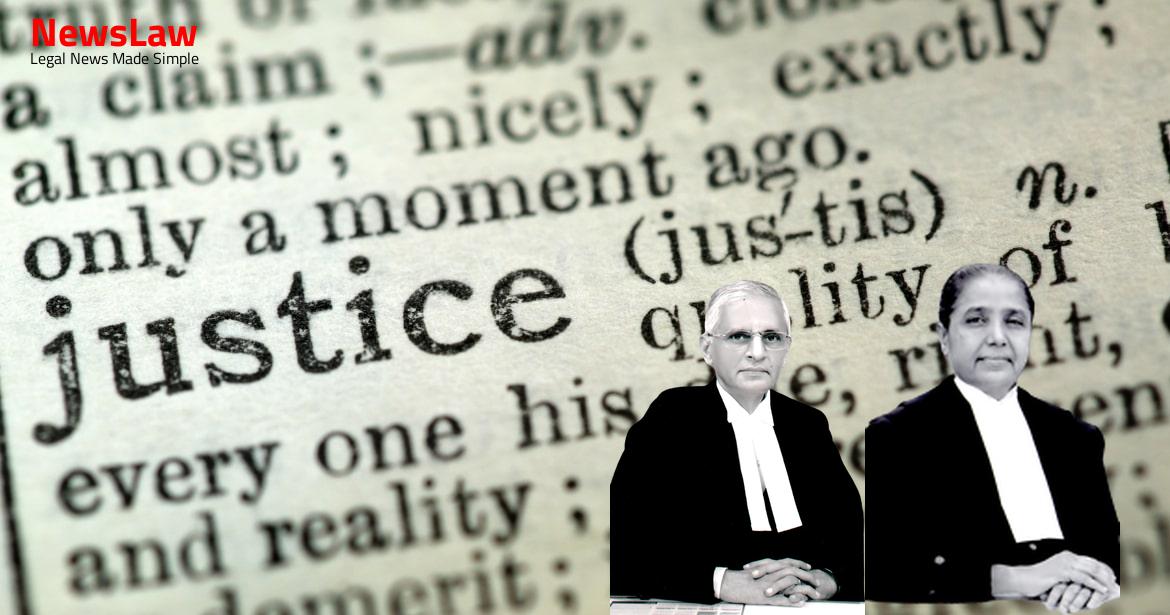In a significant judgment, the Delhi High Court has upheld the award for the regularization of workmen in a case involving South Delhi Municipal Corporation v. Workmen. The dispute regarding the regularization of the respondent workmen to the posts of AMI and APHI is at the center of this legal battle. The Industrial Tribunal’s decision in favor of the workmen for regularization has been affirmed by the High Court, emphasizing the principles of equality and justice in labor practices.
Facts
- The dispute regarding regularization of the respondent workmen to the posts of AMI and APHI is pending adjudication.
- Services of the respondent workmen cannot be altered without complying with Section 33 of the Industrial Disputes Act during the pending dispute.
- The petitioner entity, South Delhi Municipal Corporation, engaged the respondent workmen on contractual basis in 2010 for the posts of AMI and APHI.
- Respondent workmen filed a claim for regularization and differential wages in 2014, leading to the present dispute.
- Various awards of the Industrial Tribunal favored the respondent workmen for regularization, leading to the current writ petition by the petitioner entity to set aside the awards.
- The present batch of petitions under Articles 226 and 227 of the Constitution of India arise from the Industrial Tribunal awards in favor of the workmen seeking regularization.
- The respondent workmen were selected through a proper selection procedure, including interview, police verification, and medical examination for permanent and perennial job roles as AMI and APHI.
- The Industrial Tribunal framed four issues and passed the impugned Award on 13 November 2019.
- The impugned Award stated that the workmen are entitled to regularization with the petitioner entity in the roles of AMI and APHI from their initial appointment date.
- The workmen are also entitled to the difference in wages based on the principle of equal pay for equal work.
Issue
- The Tribunal framed four issues in the case.
- The first issue was to determine whether there existed an employer-employee relationship between the parties.
- The second issue focused on whether the workmen’s claims were properly represented by the Union.
- The third issue pertained to the entitlement of the workmen to their claims as per the terms of reference.
- The fourth issue aimed to determine the relief that the parties were entitled to.
Arguments
- The petitioner entity contends that the non-regularization of the respondent workmen’s services amounts to unfair labor practice.
- The respondent workmen have been working continuously for the petitioner entity for ten years, contradicting the entity’s claim of temporary engagement.
- The Industrial Tribunal ordered the petitioner to confirm if the post filling procedure was completed, showing concern for the workmen’s status.
- The Tribunal found the entity guilty of unfair labor practices for denying wages and status to the workmen.
- The petitioner’s appeal is seen as an attempt to prolong litigation and deny the Tribunal’s granted relief to the workmen.
- Contrary to the petitioner’s stance, the work done by the workmen was regular in nature, not mere stopgap measures.
- The Tribunal’s decision on regularization is supported by established legal principles and evidence on record.
- The petitioner’s argument of contractual engagement does not absolve the entity of its obligations under labor laws.
- Challenges against the Tribunal’s decision are viewed as an attempt to reevaluate findings, which is limited under writ jurisdiction.
- The engagement terms were clear in a newspaper advertisement, making the workmen aware of the contractual nature of their appointments.
- The workmen signed agreements not to seek regularizations initially, based on the contractual terms stated.
- The absence of a comprehensive selection process does not invalidate the workmen’s right to regularization.
- The Tribunal’s decision to regularize aligns with public interest and addresses potential prejudice to other interested candidates.
- The entity’s intention of temporary engagement does not remove the workmen’s entitlement to fair labor practices and regularization.
- Relevant legal precedents and CAT rulings support the workmen’s right to regularization despite contractual starting terms.
- The respondent workmen argue that the union’s presentation in favor of the workmen is sufficient for espousal.
- The petitioner entity claims that the impugned Award was passed without considering all evidence and circumstances of the case.
- Evidence of espousal of the dispute by the workmen with the management presented through affidavits and resolutions.
- The respondent workmen oppose the petition, asserting that the impugned Award was rightfully adjudicated.
- Contentions on regularization, unfair labor practices, and the powers of Tribunals in determining industrial disputes.
- Allegations of gross misuse of legal process, standard of interference by a writ court, and prolonged contractual employment of the workmen.
- Claim that the respondent workmen are entitled to regularization due to extended service duration.
- Workmen’s assertions of unfair labor practices by the petitioner entity in engaging contract employees for prolonged periods.
- Discussion on the relationship of employer and employee between the parties as confirmed by management admission.
- Adjudication on the espousal of the workmen’s claim by the Union, qualifying it as an industrial dispute for Tribunal jurisdiction.
Analysis
- The Tribunal found that the management had wrongly treated the workmen as contractual employees to deprive them of regular and permanent employee status.
- The Tribunal held that the conduct of the management amounted to unfair trade practices by employing the workmen on a contractual basis for 13 years.
- The evidence presented by the union and the resolution passed supported the claims of the workmen for regularization.
- The management did not provide a defense against the claims of continuous employment and regularization of the workmen on the posts of Assistant Malaria Inspector and Assistant Public Health Inspector.
- The continuous nature of employment and performance of duties similar to regular employees supported the claim of de facto regularization.
- The Tribunal decided in favor of the workmen for regularization with retrospective effect from their initial joining date and salary adjustments based on ‘Equal Pay for Equal Work’ principle.
- The financial strain argument of the management was rejected as legally untenable, and the necessity for regularization in cases of long-term temporary workers was emphasized.
- The lack of proper espousal by the union was not found to be a valid reason for the management’s objection to regularization.
- The Court emphasized the importance of fairness, equity, and justice in labor practices, especially when considering regularization of long-term temporary workers.
- The principle of ‘Equal Pay for Equal Work’ and the evidence of continuous service were pivotal in the decision for regularization of the workmen.
- Employees continuously employed for a significant period should not be treated as temporary forever.
- Prolonged temporary employment should not be a reason to deny workers benefits and security that come with regularization.
- Denial of equal pay for equal work is not just a matter of statutory interpretation but a constitutional mandate ensuring fairness and justice in labor practices.
- Temporary or contractual status of a worker should not be a ground for depriving them of equal pay if duties performed are similar to regular employees.
- Contractual workers working for longer durations are entitled to regularization.
- No particular form is prescribed for regularizing services, it depends on the facts of each case.
- Differentiation in pay and benefits for employees doing the same work violates Article 14 and Article 39(d) of the Constitution of India.
- The respondent workmen are entitled to regularisation.
- Proper selection procedure was followed for the workmen.
- Workmen have been working for a long period of time.
- Work done by the workmen is similar to that of regular employees.
- Writ jurisdiction is supervisory, not appellate.
- Court cannot challenge a finding of fact even if erroneous.
- Writ court will not re-appreciate evidence and substitute its own conclusion of fact.
- No such circumstances present in the current petition.
Decision
- The impugned award dated 13 November, 2019 in case I.D No. 58/2016 is upheld.
- The judgment will be uploaded on the website immediately.
- All impugned awards in the batch of petitions are upheld.
- The batch of petitions and any pending applications are dismissed.
Case Title: MUNICIPAL CORPORATION OF DELHI Vs. PRADEEP RANA & ORS. (2024:DHC:4712)
Case Number: W.P.(C)-3339/2024



